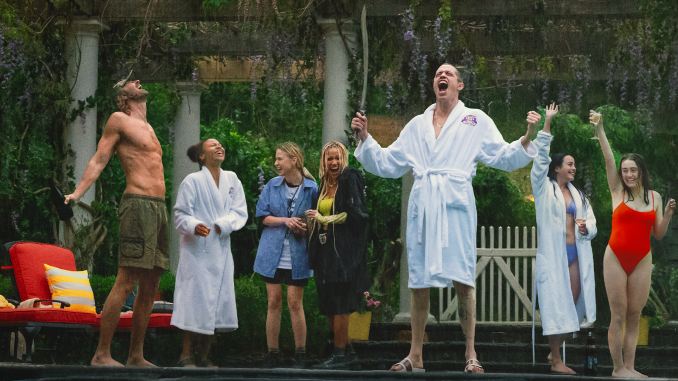O Brave New World: Bodies Bodies Bodies Is a Huxleyan Masterpiece

Between the Trump administration, pandemic, civil unrest and insurrection, America has felt especially apocalyptic in the past five years. These turbulent times—exacerbated by our unhealthy dependence on technology that ensures we experience overwhelming tragedy in real-time—have caused widespread isolation and anxiety among Gen Z, leading many of us to wonder: Is this the start of the end of the world? Halina Reijn’s Bodies Bodies Bodies screens this generational dread as an outrageous murder-mystery, jam-packed with an extravagant setting, ludicrous one-liners and facepalm-inducing twists. The film opts for dark humor and satire when examining society’s violent tendencies, moral shortcomings and mind-numbing angst, creating a murderous dystopian world. Though the film has been described in wildly contradicting ways—“a romp of a good time;” “an abhorrent, frustrating, ugly experience;” “a twisted and hilarious delight;” and, most bizarrely, a “95-minute advertisement for cleavage”—it is best taken as a modern dramatization of Huxleyan terror.
If it’s been a while since you read Brave New World, allow me to jog your memory. Aldous Huxley’s 1932 novel describes a futuristic society where science, pleasure and productivity reign supreme. In Huxley’s despotic World State, political passivity is meticulously orchestrated through Pavlovian conditioning, biogenetics, endless entertainment options and an ecstasy-like drug called soma. Everybody, no matter their position in the genetically engineered caste system, is blissfully stimulated and happy all the time. This benevolent dystopia is a stark contrast to the more frequently referenced totalitarian state in George Orwell’s Nineteen Eighty-Four. However, Huxley’s prophetic novel seems to more accurately reflect the technology-dependent culture we currently find ourselves in. This opinion is best observed in Neil Postman’s foreword to Amusing Ourselves to Death: Public Discourse in the Age of Show Business:
… in Huxley’s vision, no Big Brother is required to deprive people of their autonomy, maturity and history [because] people will come to love their oppression, to adore the technologies that undo their capacities to think… Orwell feared those who would ban books. What Huxley feared was that there would be no reason to ban a book, for there would be no one who wanted to read one. Orwell feared those who would deprive us of information. Huxley feared those who would give us so much that we would be reduced to passivity and egoism. Orwell feared that the truth would be concealed from us. Huxley feared the truth would be drowned in a sea of irrelevance. Orwell feared we would become a captive culture. Huxley feared we would become a trivial culture… In short, Orwell feared that what we hate will ruin us. Huxley feared that what we love will ruin us.
Passivity. Egoism. Triviality. These dystopian qualities jump from the pages of Brave New World and onto the silver screen in Bodies Bodies Bodies. The satirical horror follows longtime friends—Sophie (Amandla Stenberg), Alice (Rachel Sennott), David (Pete Davidson), Jordan (Myha’la Herrold) and their respective plus ones—during a mansion-destination “hurricane party” gone terribly wrong.
In Bodies, soma is offered in abundance as cocaine, hard liquor and flamboyant pop bangers courtesy of Charli XCX and Azealia Banks. These overwhelming stimuli are often extended to viewers as pills of dizzying camera movement and disordered setting. The notion that our unfocused, trivial culture will ultimately bring society’s collapse is best observed when exploring the film as an analogy for climate change. The feature is set against the backdrop of an aggressive hurricane, yet the severe weather phenomena is of little concern to the young characters. In fact, the group finds excitement in the chaos, cheering and popping champagne bottles when it begins to rain on them in an early sequence. Later, Jordan, Alice and Emma (Chase Sui Wonders) lounge around a cluttered kitchen island donning luxurious white robes. Around them, the faint buzzing of a weather report and the film’s non-diegetic score overwhelms the auricular landscape. Though she’s busy doing everything else besides listening to the report, Alice scoffs, “Ugh, my God. Can you turn that off? It’s bumming me out.” Emma turns off the television and the trio proceed to drink expensive booze and record a video of themselves dancing to Curtis Roach’s viral song “Bored in the House.” The outside world is annoying and boring. What really matters to this group are their drugs, their petty drama and their fun. The tropical cyclone acts as nothing more than a mere inconvenience to them, a blip on their radar of narcissism and self-indulgence—and a wonderful excuse to party.
-

-

-

-

-

-

-

-

-

-

-

-

-

-

-

-

-

-

-

-

-

-

-

-

-

-

-

-

-

-

-

-

-

-

-

-

-

-

-

-








































